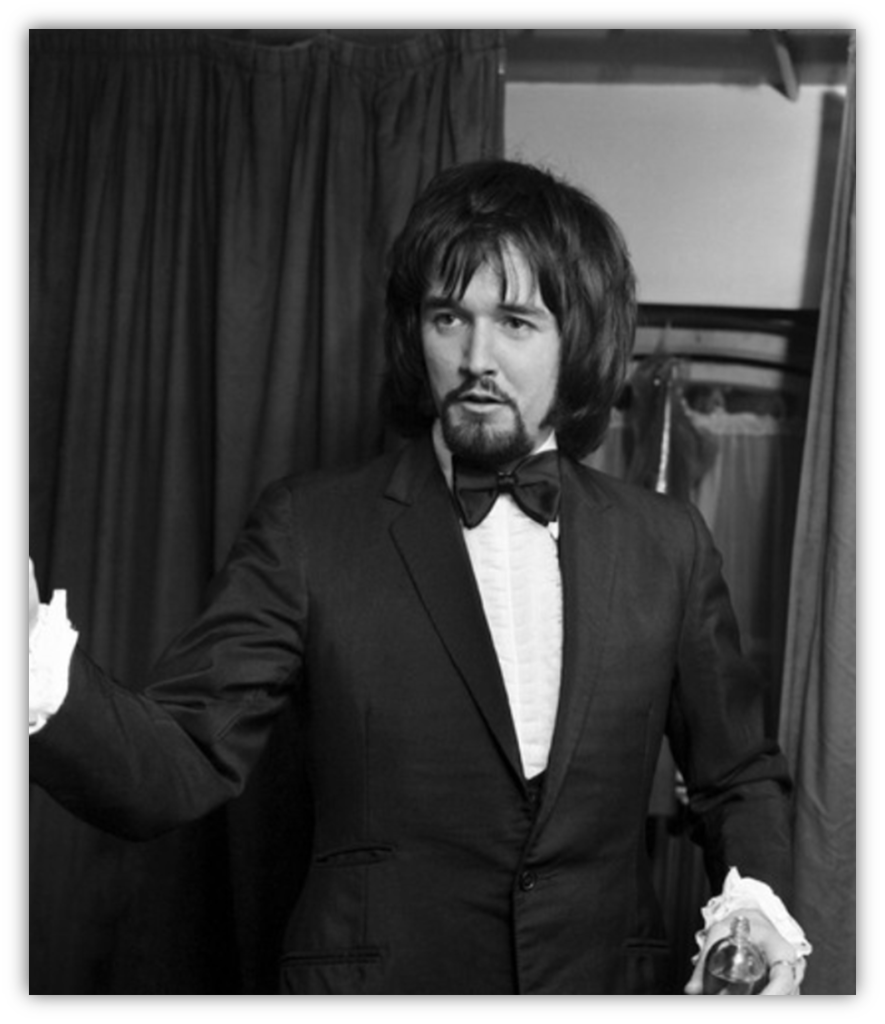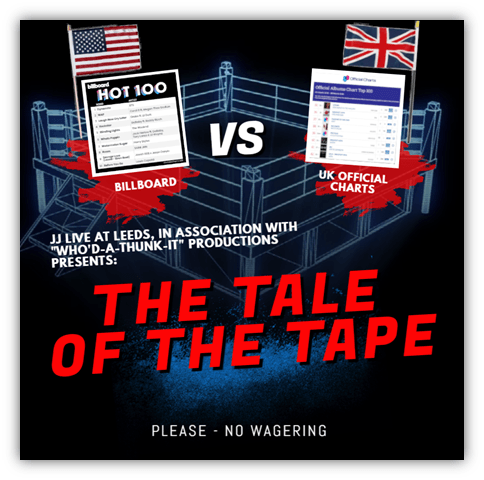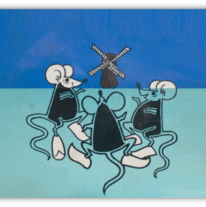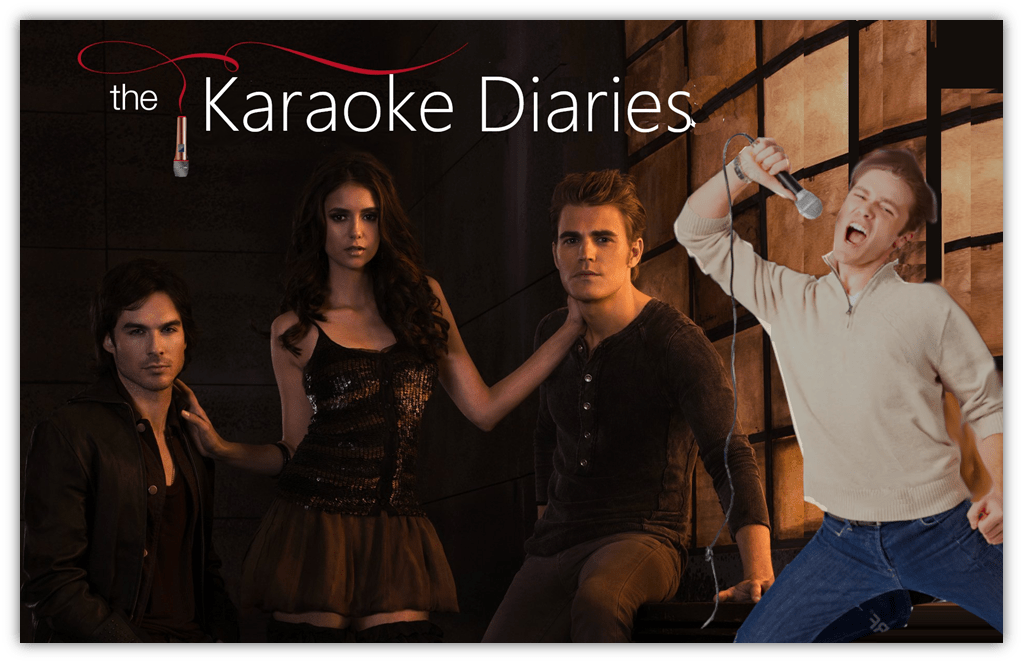In previous episodes from UK culture I took you through the biggest acts on the UK charts never to have troubled Billboard.
Now for not quite the opposite perspective:
Finding US acts that made it here but never appeared on any Billboard chart is too much of a stretch.
But here are a selection of US acts that were bigger in the UK.
Some will be more familiar than others and the inclusion of others may surprise you – speaking of which: straight in with…
REM

The Tale Of The Tape:
Singles
Top 10 UK = 11 vs US = 4
Top 40 UK = 31 vs US = 9
Albums
#1 UK = 8 vs US = 2
Top 10 UK = 11 vs US = 10
Top 40: UK = 21 vs US = 17
You might be raising an eyebrow and saying, “Yeah JJ, they were kind of a big deal here, but the stats don’t lie.”
Their UK top 40 singles career ran from 1989 with Orange Crush (#28) to 2005 and Wanderlust (#27). They arrived in the public consciousness earlier in the US with The One I Love making #9 in 1987 but their last Billboard top 40 entry was a decade before the UK; Bang and Blame (#19) in 1995.
On the Billboard 200 Album Chart, they made an impact even earlier with Murmur reaching 36 in 1983 and Document putting them in the Top 10 in 1987 (#10). It took a while longer for us to pick up on them. Fables of the Reconstruction (#35) their first UK Top 40 entry in 1985 and it wasn’t until Out Of Time that they breached the Top 10, also giving them their first #1.
From that point, our REM lovefest was set. Only two of their subsequent studio albums failed to reach #1 (Up #2 and Collapse Into Now #5). And they were a frequent presence in the singles Top 10.
Across all their albums they gained 24 Platinum certifications in the UK against 17 in the US. Out of Time and Automatic For The People spent 214 and 246 weeks on the UK charts against 109 and 76 in the US.
What can I say? We just liked them a bit more.
The Walker Brothers

The Tale Of The Tape:
Singles
#1: UK = 2 vs US = 0
Top 10: UK = 4 vs US = 0
Top 40: UK = 10 vs US = 2
Albums
Top 10: UK = 5 vs US = 0
Top 40: UK = 6 vs US = 0
They weren’t brothers. And none of them were called Walker.
Actual brothers with the name Walker may also disagree at the use of the definitive article. Scott Engel, Gary Leeds and John Maus found fame after moving to Britain with their baroque pop ballads led by Scott’s rich baritone.
All three had solo careers which continued the trend of having no impact in the US. But in the UK: One top 40 hit for John, two for Gary and three for Scott, who also claimed a #1 album, and three more in the top 10. That was before he embarked on a more ‘individual’ path. But even when recording albums that were far from chart friendly, they still kept making the charts, with Tilt reaching #27 in 1995.
PJ Proby

The Tale Of The Tape:
Singles
Top 10: UK = 4 vs US = 0
Top 40: UK = 11 vs US = 1
Mid 60s pop star PJ isn’t well remembered. And the one thing people are likely to know about him is his career ending moment rather than his music.
That was true for me. That moment was an onstage pants splitting incident that resulted in PJ being banned from theatres across Britain, and blacklisted by TV and radio. Its not in doubt that the incident happened. but whether it was deliberate or accidental, and how much of PJ was revealed is a matter of conjecture.
To write this I started reading up on PJ and realised that truth is way wilder than fiction. There’s no way I can do justice to his story in a couple of paragraphs. Every article I read threw up more twisted realities. PJ has lived a life, one that at times has been a wrecking ball to taste and decency. If you want to know more I’ll be back at some point to fill in his story.
His first couple of hits jumped on the Beatles sound. But with Somewhere he crossed into the same territory that would prove fruitful for The Walker Brothers: deep voiced orchestrated ballads. Except that where Scott Walker played it straight, PJ’s mannered phrasing and delivery on Somewhere is something of an acquired taste. I can see why his one Billboard entry came with Niki Hoeky in 1967 (#23) which had an R&B feel, and left the vocal weirdness behind.
Fun Lovin’ Criminals

The Tale Of The Tape:
Singles
Top 10: UK = 1 vs US = 0
Top 40: UK = 8 vs US = 0
Albums
Top 10: UK = 3 vs US = 0
Top 40: UK = 6 vs US = 0
Maybe FLC could only work outside their home country.
Even to this outsider they came across as caricatures, trying too hard to be dangerously cool outsiders. Scooby Snacks brought them to prominence telling a story about them ‘running around robbing banks all whacked off of scooby snacks’ while sampling dialogue from Pulp Fiction for extra borrowed cache. Other songs on the debut played up the idea that they were operating outside the law, but with a “hey, its nothing serious” vibe.
I can see why the lack of authenticity meant this shtick didn’t work for them at home.
Debut album Come Find Yourself charted at 144 on Billboard and Scooby Snacks made 14 on the Alternative Airplay chart, but that was as good as it got at home. They focused on the UK to the extent that singer Huey relocated here, becoming a BBC Radio DJ and a regular on daytime TV. Which I don’t think anyone, least of all Huey saw coming, based on their early image.
White Stripes

The Tale Of The Tape:
Singles
Top 10: UK = 5 vs US = 0
Top 40: UK = 13 vs US = 1
Albums
#1: UK = 2 vs US = 0
Top 10: UK = 3 vs US = 3
Top 40: UK = 5 vs US = 6
It took a while for Jack and Meg to get noticed on either side of the Atlantic.
Things picked up with third album White Blood Cells and a slow burn success gathered momentum. That album charted in the UK a month after release bolstered by their first three singles entries setting them up to go big when Seven Nation Army came out in 2003.
The UK charts offer the ideal structure for alternative acts to break through. The compact size of the country allows bands to tour and build up fanbases and having a national radio station that outside the daytime schedules promotes indie, rap, dance, etc gave acts like White Stripes exposure.
With the charts being purely sales based (pre streaming) singles could enter high up as the fanbase rushed to buy it on the week of release and gave further national exposure via and pushing them onto the daytime schedules.
In this case, White Stripes transferred back across the Atlantic with their last four albums each charting higher; 61 – 6 – 3 – 2. They finally broke into the Billboard top 40 with the Icky Thump single reaching #26. And having become top 40 regulars in the UK, it also gave them their highest singles placing here, at #2.
While the White Stripes demise stopped their forward momentum, Jack did crack the US #1 spot with his first three solo albums.
The Three Degrees

The Tale Of The Tape:
Singles
#1: UK = 1 vs US = 1
Top 10: UK = 5 vs US = 2
Top 40: UK = 10 vs US = 3
Albums
Top 10: UK = 3 vs US = 0
Top 40: UK = 5 vs US = 1
It took The Three Degrees much longer than White Stripes to get recognition.
And in their case it came in the US first. They formed in the early 60s and made it to #80 on the Billboard charts in 1964 with Gee Baby (I’m Sorry) but other than one even more minor hit it was 1970 and various line up changes before they made the Billboard top 40 with Maybe. After a brief run of minor hits, there was another wait until they got their big chance, courtesy of Gamble and Huff, appearing on #1 TSOP (Tom Breihan scored it an 8) and then a worldwide hit on their own with When Will I See You Again.
Rather than marking the beginning of a rich chart career, the #2 hit was the last time they appeared on the Hot 100.
WWISYA was a UK #1 and this became their primary market, with their top 40 singles stretch lasting til 1979. They had a number of TV specials and gained the (dubious) accolade of being the then Prince Charles’ favourite group. Lead singer Sheila Ferguson made her home in the UK and left the group in the mid 80s, becoming a TV and radio personality here. The Three Degrees still carry on now through many more line up changes.
The Outhere Brothers

The Tale Of The Tape:
Singles
#1: UK = 2 vs US = 0
Top 10: UK = 4 vs US = 0
Top 40: UK = 5 vs US = 0
I’ll let you in on a secret; like the Walkers, they aren’t really brothers.
Their first two (non charting) singles were Pass The Toilet Paper and F*** U In the A**. Which gives an idea of what we’re dealing with.
Its like when rap first impinged on Tom Breihan’s column with the likes of Marky Mark and Sir Mix-A-Lot. That side of the genre that didn’t take itself as seriously found a mainstream audience was more receptive. The OBs jumped on the back of a tried and tested template.
The charts in the 90s were full of Eurodance tracks (Snap, Culture Beat, Captain Hollywood Project and more) with rap verses shoehorned in. The Outhere Brothers used generic dancebeats and extended the rap part, but kept them as basic as possible. As evidenced by their pair of chart toppers; Don’t Stop (Wiggle Wiggle) and Boom Boom Boom.
Those titles may have seemed innocent enough (especially in comparison to the first two singles), but they still had to be heavily edited to make them appropriate for radio play. I imagine there were some surprised parents when they discovered the non radio edits, as it was definitely the kids that were responsible for their success.
I commend you all on resisting their charms. Boom Boom Boom gave them their only entry on the Billboard Hot 100 at 65. Thankfully as novelties are so inclined, they didn’t last long.
But 5 top 40 hits is still 5 too many.
Orson

The Tale Of The Tape:
Singles
#1: UK = 1 vs US = 0
Top 40: UK = 4 vs US = 0
Albums
#1: UK = 1 vs US = 0
Top 40: UK = 2 vs US = 0
Orson are the one act I can’t see had any Billboard presence.
They’re primarily remembered for having the lowest ever weekly sales for a #1 of 17,694 copies (this was before downloads.) Though on the other hand, they still sold more than anyone else that week. Also in its favour despite the dismal sales figure the week it reached the top, it eventually went Gold, selling 400k overall.
They were a rock band in a similar vein to early Maroon 5. But unlike them, they never kicked on or adapted from their initial success. In a crowded market, I’m more surprised that they managed to breakthrough here than the fact they had zero impact in the US.
They were pretty anonymous. And after that #1 single sustained a #1 album and a few follow ups the second album swiftly disappeared, and that was the end of Orson.
Hope you enjoyed the selections!
Let the author know that you liked their post with a “Green Thumb” upvote!





Bubbling Under
There were plenty of contenders for this, a few more that were under consideration for this;
Blondie and Meat Loaf are in the REM category of big name acts that did even better on the UK charts.
Then there’s the likes of Sparks, David Cassidy, Suzi Quatro, Anastacia, Belinda Carlisle, Kings of Leon, Moby, Armand Van Helden, Voice of the Beehive, Faith No More and Duane Eddy.
It’s possible that due to the way our respective charts are compiled distorts the picture but in terms of UK top 40 vs US top 40 chart positions they all fared better over here.
Yeah, Suzi Quatro came to mind for me, too, but I can understand why she didn’t make the cut — the ones you listed as much less remembered here whereas Suzi did have that big AT40 hit and lots of attention at the time for being more popular away from home. Great job!
Thanks! I’ve seen Suzi and Sparks mentioned lots in comments here and at SG so wanted a bit of variety and to showcase some lesser known names.
Oh wow, I had totally forgotten about that “boom boom boom” song. Straight to my 90’s radio mix! Thank you sir!
In a documentary on the Pixies, I got the impression that they did a lot better in the UK than the States, but maybe not in terms of charting singles?
In any event, God Save the UK Top 40. 💂
Yeah, the Pixies got 3 singles into the UK Top 40. “Debaser” went to #23!
Talk about a land of the free and the home of the brave!
Similar story in the albums charts; six of their eight studio albums made the UK top 10 – Bossanova at #3. Whereas in the US Indie Cindy is their highest charting album at #23 and their next best is #70.
Chart positions don’t tell the whole story as despite Doolittle only charting at #98 Wikipedia says it sold 834,000 copies in the US which suggests a real slow burn of small numbers of people continuing to buy it over a long period of time.
And on the subject of that boom boom boom song; I remember going over to my uncle’s house while it was riding high in the charts. My cousins who are a few years younger than me and would have been around 10 at the time were there with some friends listening to it. The song would end and they rewound it back to the start and played it over and over and over……. I was there around half an hour and it was all I heard, it was weirdly unsettling, none of them spoke just listened intently again and again. Kids are weird.
My brother had a friend who whose brother was…a little different. And if you ever took a ride with him, apparently all he ever listened to was “Ding Dong the Witch Is Dead,” over and over again. That is just some kind of hell right there.
The compact size of the country allows bands to tour and build up fanbases
Mercator has fooled many Americans into thinking Britain is much larger than it really is. All of England is roughly the size of Iowa. The whole UK is slightly smaller than Oregon.
Nevermind Britain, there was some serious pro-Greenland bias from Mercator. Though even real size there may be other reasons as to why Greenland is missed off most touring schedules.
Like the Walker Brothers and Fun Lovin’ Criminals, I also have zero Top Ten hits in the States. I shoulda moved to England.
#JusticeForGGAllin?
Todd Phillips, there you are. That’s the real you. (Standing in a mall cineplex, staring at a poster.) Music nerds weren’t surprised that the Road Trip/Hangover guy was at the helm of Joker. I interpret Joaquin Phoenix’s character as a GG Allin stand-in.
I interpreted him as a Rupert Pupkin/Travis Bickle stand-in. DeNiro must have been tickled.
This is the better take. Was that even Gotham? You had all these period piece posters, like Wolfen. Gotham is supposed to be a fictional metropolis. Either the fourth wall was being broken, or that was supposed to be a major American city all along, like a Twilight Zone-like twist ending.
I retract my original assessment. There is an act of violence in Joker. I shouldn’t attribute it to somebody who has no felony record.
I apologize.
Up is a 10.
Got curious as to what got in the way of Up and interrupted the chart topping dominance. Robbie Williams at the height of his powers released I’ve Been Expecting You on the same day. No contest no matter how good Up may be.
“Walk Unafraid” is featured in the American film Wild, starring Reese Witherspoon. First Aid Kit gets cred for recognizing the genius(in my opinion) of Up before the reissue, before Pitchfork, I hope, rehabilitates the album’s reputation as being a failure, when it gets reissued.
I have a series of Gary Numan reissues, up to Warriors. The writer responsible for the liner notes cites Numan’s fretless bass period as an influence on Up.
R.E.M. awareness isn’t the best thing about First Aid Kit. It’s their tribute song “Emmylou”. I saw a video of them performing it live with Harris in audience. She looked genuinely moved. Harris seems much-beloved in Europe. Belgium’s Admiral Freebee dueted with Harris on a song called “Coming of the Knight”. I want to knows whose management called to make that happen.
Robbie Williams is one more artist on a pretty long list that I retroactively like. I understand Spotify is, a little evil, but I do buy CDs, and some of the artist I discovered through streaming does lead to physical sales. It’s like standing at the Tower Records’ listening booth for forty minutes.
Now let’s do the Germany version of this column, featuring David Hasselhoff and The Connells…
I guess The Hoff could have qualified for this column on the basis of his two UK top 40 entries. He’s the proud owner of #35 and #3 hits. The Connells were one hit wonders – twice. 74-75 made #14 in 1995 and came back for another go in 1996 but only made #21 second time round.
I think David Hasselhoff nails “Head On”.
Another fascinating topic; thanks for that JJ!
I guess the fact that I only recognize three of the eight artists you covered proves your point, JJ. Fun article – thank you!
“The Sun Ain’t Gonna Shine Anymore” by the Walker Brothers is a record so magnificent that it blows my mind it failed to make the top 10 in America (it peaked at #13). Great article, JJ!
Huey Morgan’s BBC Radio Shows on 2 and 6 were a treasure trove of musical discoveries for me. I enjoyed him infinitely more than FLCs. He just can’t sing, but the guy oozes cool and has wonderfully eclectic music taste. His comments on records he doesn’t like, but has to play on his show, are funny as well. Scott Walker is a musical Deity and the Walker Brothers were also stellar. For a converse, Prince was less successful in the UK. Too much Frankie! Enjoyed the writeup and selections. London Calling!
Thanks!
It should be a matter of national shame that the icon of the 80s that is Prince didn’t make it to #1 til 1994 and with a song that makes me go ‘eurgh’. Best to listen to When Doves Cry and pretend his chart topper never happened.